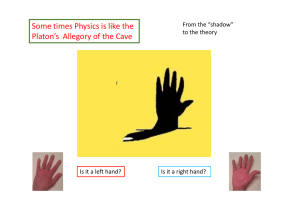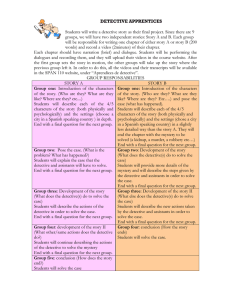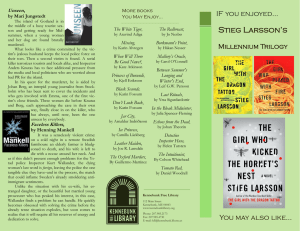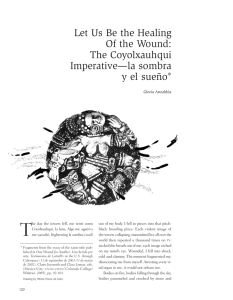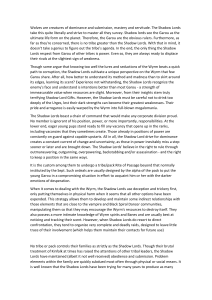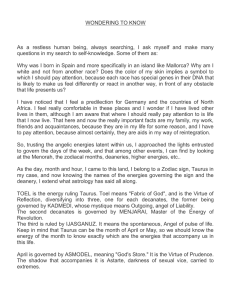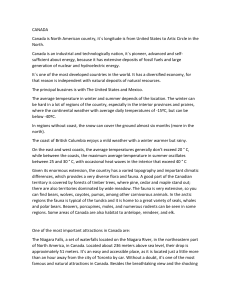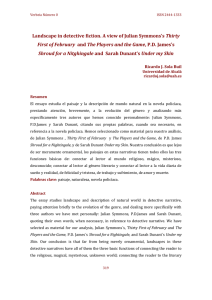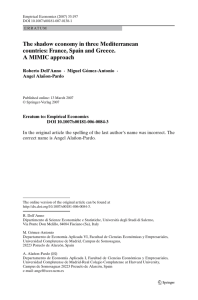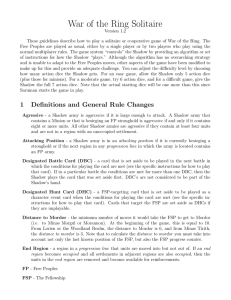The shadow man; John Katzenbach
Anuncio
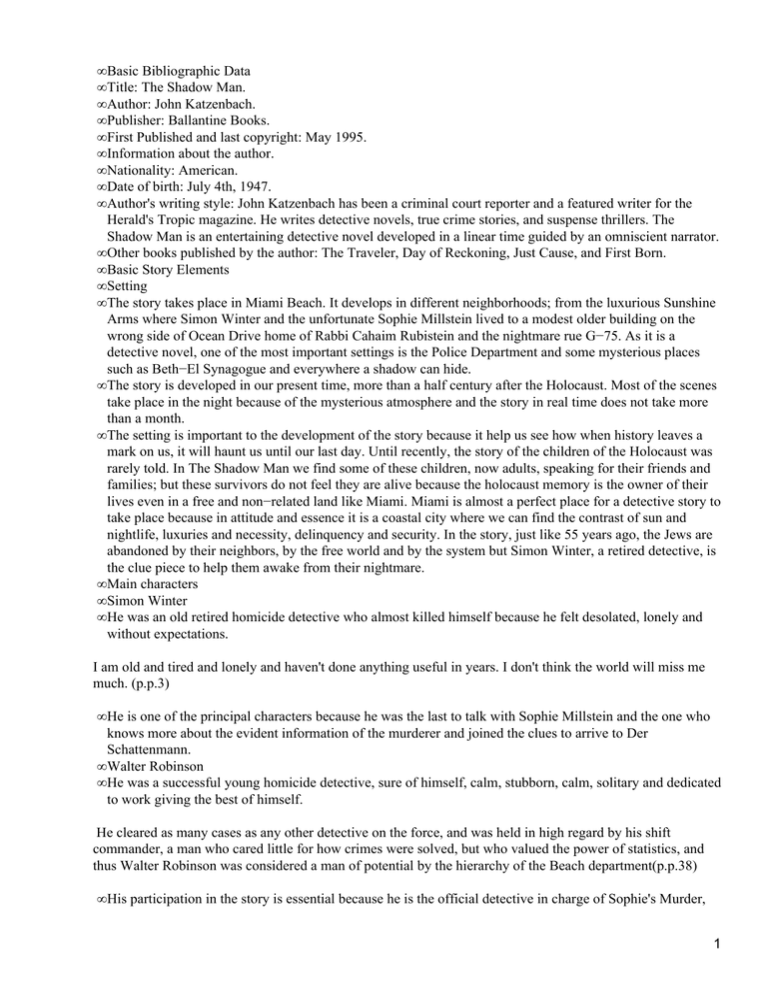
• Basic Bibliographic Data • Title: The Shadow Man. • Author: John Katzenbach. • Publisher: Ballantine Books. • First Published and last copyright: May 1995. • Information about the author. • Nationality: American. • Date of birth: July 4th, 1947. • Author's writing style: John Katzenbach has been a criminal court reporter and a featured writer for the Herald's Tropic magazine. He writes detective novels, true crime stories, and suspense thrillers. The Shadow Man is an entertaining detective novel developed in a linear time guided by an omniscient narrator. • Other books published by the author: The Traveler, Day of Reckoning, Just Cause, and First Born. • Basic Story Elements • Setting • The story takes place in Miami Beach. It develops in different neighborhoods; from the luxurious Sunshine Arms where Simon Winter and the unfortunate Sophie Millstein lived to a modest older building on the wrong side of Ocean Drive home of Rabbi Cahaim Rubistein and the nightmare rue G−75. As it is a detective novel, one of the most important settings is the Police Department and some mysterious places such as Beth−El Synagogue and everywhere a shadow can hide. • The story is developed in our present time, more than a half century after the Holocaust. Most of the scenes take place in the night because of the mysterious atmosphere and the story in real time does not take more than a month. • The setting is important to the development of the story because it help us see how when history leaves a mark on us, it will haunt us until our last day. Until recently, the story of the children of the Holocaust was rarely told. In The Shadow Man we find some of these children, now adults, speaking for their friends and families; but these survivors do not feel they are alive because the holocaust memory is the owner of their lives even in a free and non−related land like Miami. Miami is almost a perfect place for a detective story to take place because in attitude and essence it is a coastal city where we can find the contrast of sun and nightlife, luxuries and necessity, delinquency and security. In the story, just like 55 years ago, the Jews are abandoned by their neighbors, by the free world and by the system but Simon Winter, a retired detective, is the clue piece to help them awake from their nightmare. • Main characters • Simon Winter • He was an old retired homicide detective who almost killed himself because he felt desolated, lonely and without expectations. I am old and tired and lonely and haven't done anything useful in years. I don't think the world will miss me much. (p.p.3) • He is one of the principal characters because he was the last to talk with Sophie Millstein and the one who knows more about the evident information of the murderer and joined the clues to arrive to Der Schattenmann. • Walter Robinson • He was a successful young homicide detective, sure of himself, calm, stubborn, calm, solitary and dedicated to work giving the best of himself. He cleared as many cases as any other detective on the force, and was held in high regard by his shift commander, a man who cared little for how crimes were solved, but who valued the power of statistics, and thus Walter Robinson was considered a man of potential by the hierarchy of the Beach department(p.p.38) • His participation in the story is essential because he is the official detective in charge of Sophie's Murder, 1 and his objectiveness help the case to be solved. • Esperanza Martínez • She was an attractive sensitive young Cuban woman. She had the moral burden of revenge for her brother, causing her not to dedicate time to her personal life, only to her work as a State Attorney. −Tell me, Walter, Who are you? −Who am I? I'm a police detective that's almost got his law degree and− She held up her hand.−No. Not what are you. Who are you?(p.p.192) • She got involved more than she ever thought in the case, she even involved emotionally and received a bullet, but helped Walter to take into consideration facts that are not so objective. • Rabbi Rubistein • He is a calm distrustful old man, holocaust survival, worried for others but always sensible. −Mr. Winter? −Rabbi? −Could you show me some some identification? With a picture on it(p.p.68) • He is important because he was the one who received Stein´s suicide note and one of Sophie's best friends so he trusted in Mr. Winter to help him not to be killed. • Frieda Kroner • She is an old Jew and an expressive woman, always direct and firm in thought, intelligent and always with the right comment. −What do I know of guns?−Fireda Kroner interrupted−And what do you know, you old fool? More than likely, you will shoot yourself, or your neighbor, or the delivery boy who brings your heart medicine from the pharmacy.(p.p.73) • She is a clue character cause everyone would though she would be the next to die but she continue living to help catch the catcher. • The Shadow Man • None knew his name, in whispered circles he was known only as Der Schattenmann, a merciless catcher for the Nazis during the Second World War who was always there when the trains went to Auschwitz. He was an elusive killer who was stalking Holocaust survivors in Miami. −This is all remembrance−he continued−We remember. And so does Der Shattenmann. He must have thought he had killed us once, and now he will try again. We were all just slightly more than children then, Mr. Winter, and this must have been what saved from him(p.p.79) • His importance is evident, he is the reason why the story came to life. He was the one that in dreams, memories, images a mirage or reality was torturing the survivors. • Plot • The plot concerns an assassin who's killing Holocaust survivors in Miami Beach. The catch is that he is Der Schattenmann (The Shadow Man), a ruthless killer who found and captured Jews for the Nazis and helped send them to Auschwitz. There's only a few survivors left who can identify The Shadow Man, and they know he's coming after them. • There are many factors than complicate the problem and keep it from being resolved. • None ever have known the name of the Shadow Man. 2 • There was not tangible evince that he was involved in Sophie's and Steins' deaths. • Walter Robinson caught Jefferson as Sophie's murderer and the case were closed. • Irving Silver disappeared without leaving print. • The problem is finally solved because Simon Winter, the retired detective, and Walter Robinson, the young enthusiast detective, began working together and joining and complementing ideas and actions. Winter matched wits with a sadistically smooth expert on death who lives for the thrill of the hunt, tortures for the rush of power and murders for not to be discovered for those who knew him during the Holocaust. They concluded that this man did have a name and even each one remembered him with a different physical identity, had a fixed appearance and the only way to catch him was playing his own game but they couldn't caught the catcher because he committed suicide before, so he kept himself and his history hidden forever. • Personal Opinion • I liked the book because it is a very intriguing and suspenseful story; it always gets your attention. What I liked the most was the topic. I have always been attracted by the Second World War related themes and by Jewish traditions, so this book was like written for me because I have also always liked thrillers. • The only part I think should be changed is that where Irving Silver disappeared because, in my opinion, the fact do not receive the importance and the analysis that it deserves. The author only dedicates a page and it can have its own chapter. In general, I consider the book is well−developed, the story is easy to follow, and all the details have a reason to be there. The descriptions are not excessive, there are only the necessary ones, and each character is an important piece of the puzzle to build the great thriller it is. • What I learnt from the book is that each thing you live, marks you. That is why you must search to live and experience things that makes you richer, that helps you to grow intellectually and spiritually. Unfortunately, there are times where you cannot control what you live, like the case of the Jews in the Second World War, that is why we that have freedom must take advantage of it. Everything you see, hear, feel, become part of you. If it is something good, it will helps you keep going, but if it is not, it will be like a rock you will be pulling and that never will let you be unless you totally get rid of it. Sometimes we have memories of our past that are like shadows that we confuse with reality and in our hands is to get conscious of this to eliminate it from the root. • The worst nightmare of these Holocaust survivors were The Shadow Man, a traitor, a member of their own community that became a catcher just because his devotion to death. I think the hidden message is that the factor that is making you more harm can be part of yourself or be very close to you, so you can never distract and do not feel like hunted. Just take the problems as they come and never turn around, solve them, before they go bigger. • First of all, I recommend this book to Jews because they will feel identified with the story. But, in general, I recommend The Shadow Man, to every single person that likes to learn, that is interested in general culture, that loves suspense stories and that can easily identified with characters. Just walk a mile in somebody else's' moccasins. It is horrifying to imagine surviving the Holocaust only to be tracked again by the same monster that stalked one fifty years ago. I am sure this kind of people will love this book because it is supported with solid writing, a plot that´s full of menace, and plenty of suspense with an authentic historic background and well−drawn characters. • Vocabulary • Jumpy • Meaning: Nervous, Jittering. • He felt brandishing it was slightly foolish, and he had enough experience to know that Sophie's fear had made him jumpy and nervous as well.(p.p.18) • Lurk • Meaning: To lie in wait in a place of concealment especially for an evil purpose. • Quickly bent down on one arthritic knee that immediately complained, and saw that no one was lurking beneath the bed(p.p.19) • Chastise • Meaning: To censure severely. • He shook his head to dislodge the sensation of certainty of dread that overcame him, chastised himself for showing the uncertainty of age, and strode past the cherub in the fountain(p.p.22) 3 • Bitter • Meaning: marked by intensity or severity. • −I saved you− she said bitterly, surprising herself with her own anger.(p.p.24) • Hamper • Meaning: A large basket usually with a cover for packing, storing, or transporting articles. • She hurried into the bedroom and slipped out of her clothes, taking the time to carefully hang her dress in the closet and drop her undergarments into a white wicker hamper.(p.p.30) • Geezer • Meaning: A queer, odd, or eccentric person −− used especially of elderly men. • So, what's the geezer's story? − Name is Winter, lives across the courtyard(p.p.46) • Cripple • Meaning: To deprive of the use of a limb and especially a leg. • Walked? −Frieda Kroner asked− He is crippled?(p.p.260) • Slam • Meaning: To utter verbal abuse or harsh criticism . • The policeman slammed him again(p.p.251) • Extol • Meaning: To praise highly. • Sporting a tattoo extolling the virtues of a heavy−metal rock band high on the considerable muscle of his arm.(p.p.250) • Summon • Meaning: To issue a call to convene. • And she summoned a policeman and the teenager says this, and says that and lies this way and that.(p.p.232) INSTITUTO TECNOLÒGICO Y DE ESTUDIOS SUPERIORES DE MONTERREY CAMPUS ESTADO DE MÈXICO Advanced English C Jacqueline Gage Bookreport The Shadow Man John Katzebach Mercedes Perea Tamariz 456641 May 2nd, 2000 4
